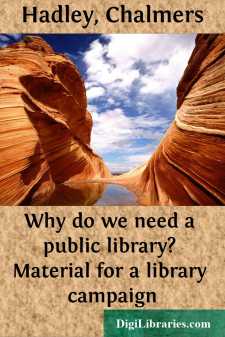Categories
- Antiques & Collectibles 13
- Architecture 36
- Art 48
- Bibles 22
- Biography & Autobiography 813
- Body, Mind & Spirit 142
- Business & Economics 28
- Children's Books 15
- Children's Fiction 12
- Computers 4
- Cooking 94
- Crafts & Hobbies 4
- Drama 346
- Education 46
- Family & Relationships 57
- Fiction 11828
- Games 19
- Gardening 17
- Health & Fitness 34
- History 1377
- House & Home 1
- Humor 147
- Juvenile Fiction 1873
- Juvenile Nonfiction 202
- Language Arts & Disciplines 88
- Law 16
- Literary Collections 686
- Literary Criticism 179
- Mathematics 13
- Medical 41
- Music 40
- Nature 179
- Non-Classifiable 1768
- Performing Arts 7
- Periodicals 1453
- Philosophy 64
- Photography 2
- Poetry 896
- Political Science 203
- Psychology 42
- Reference 154
- Religion 513
- Science 126
- Self-Help 84
- Social Science 81
- Sports & Recreation 34
- Study Aids 3
- Technology & Engineering 59
- Transportation 23
- Travel 463
- True Crime 29
Why do we need a public library? Material for a library campaign
by: Chalmers Hadley
Description:
Excerpt
MATERIAL FOR A PUBLIC LIBRARY CAMPAIGN
One of the most effective means of conducting a library campaign, especially in its early stage, is through the press. Not only will the reading and thinking part of the people thereby be reached, but any library editorial appearing in a newspaper, will, because of the public notice given it, receive greater consideration than if printed elsewhere. Library Commission workers and library supporters in general, have felt the need of printed material which could be made immediately available in a library campaign. Most library addresses and articles are too long, too scholarly in treatment or have lacked that crisp style necessary for use in the press.
Editors of newspapers are slow to accept for printing, signed editorials which have seen service elsewhere. It is suggested that the material here compiled be made as local as possible in its application to individual communities, and that the editorials be sent to newspapers unsigned by the original writers. The same editorials should not be sent to neighboring communities, at least in their original form. Every attempt should be made to have them appear as fresh and spontaneous as possible. Different editorials should always be sent the several papers in the same city.
The material here compiled is suggestive and sufficiently comprehensive to meet ordinary conditions. Much valuable material has been taken from circulars sent out by the Library Commissions of Oregon, Wisconsin and Iowa.
No better advice could be given in opening a public library campaign through the public press than the following, in the Wisconsin Free Library Commission Circular of Information, No. 5:
1 Citizens of —— believe in free public libraries. They need organization and courage to attack local problems rather than long homilies on the value of good literature.
2 Public sentiment needs time to ripen. Frequent short articles running through the issues of a few weeks are better than a few long ones.
3 Make the articles breezy, optimistic, with local application. You can get a library if you are in earnest.
4 Appeal to local pride. Civic patriotism is the basis of civic improvement. Give the names of familiar towns of similar size which have good libraries.
5 Do not rely solely on editorials. Get brief communications from citizens, but have each letter make only one point, and that crisply.
6 Do not waste space rebutting trivial arguments. Refute them by affirmative statements.
7 Get brief interviews with visitors from towns where they have good libraries, and with your own townsmen who have visited neighboring libraries.
8 Keep this fact in mind—Your people want a library and only need pluck and a leader.
9 Remember that the worst enemy of the movement is the talker who wants a library very much, in the "sweet bye and bye," when all other public improvements are completed.
10 When it is time to strike—strike hard. Apologies and faint hearts never won any kind of a contest.
CHALMERS HADLEY,
Secretary American Library Association....


